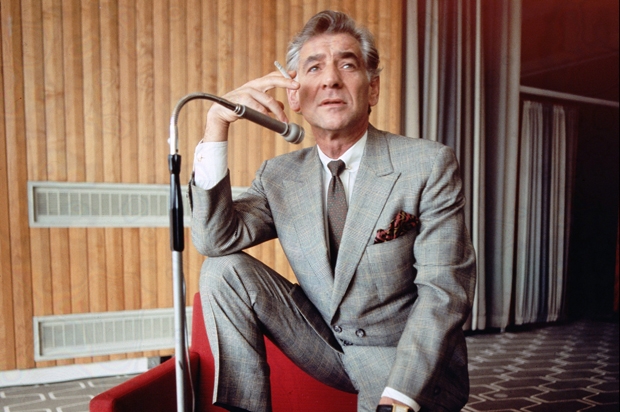On 17 May 1969 Leonard Bernstein ended his 12-year run as musical director of the New York Philharmonic with a performance of Mahler’s Third. The next night he went to see Jimi Hendrix play Madison Square Gardens. And there you have him. Was Bernstein a fragile romantic or a firebrand rocker? Was he the spiritual visionary who gave us Chichester Psalms or the tin-pan-alley tunesmith behind West Side Story?
Bernstein went to his grave claiming it was possible to be all these things and more — insisting that you could be a political activist and a concert pianist, a conductor of the challengingly atonal and a writer of the melodically unforgettable. Not everyone was convinced. There were, and are, critics who believe that Bernstein’s facility and fecundity was mere dilettantism. Allen Shawn’s suave new biography hopes to give them pause.
Bernstein was a child prodigy, talking before he was 18 months old, picking out tunes on an aunt’s piano from the moment it fetched up in his parents’ Boston home. A few months later he was outplaying his first tutor, and within a couple of years had mastered Gershwin’s Rhapsody in Blue (a struggle for the average Grade 8 student). He was composing at 12, and by the time he got to Harvard, his party piece was flattening the dominants in Mozart sonatas to make them sound ‘like Grieg’. Little wonder a musician as variously gifted as Richard Rodgers once asked Bernstein whether there was ‘anything you don’t do better than anyone else?’
Well, his score for Zeffirelli’s biopic of St Francis, Brother Son, Sister Moon was rejected — mercifully, you might think, when you learn that Bernstein subsequently transformed much of what he’d written for the movie into his Mass. This early 1970s mishmash of marching bands, choral chants and electric guitars makes John Lennon’s Yoko-inspired yawns on the White Album seem the last word in sing-along fun.
Nor was his 1973 Harvard lecture series The Unanswered Question altogether successful. In these long, demanding talks, broadcast here by the BBC, Bernstein tried to find parallels in musical composition for the same deep biological structures Noam Chomsky had recently claimed underpinned all languages. Punctuated by piano interludes in which the elegantly suited Bernstein sought to concretise ineffably abstract ideas with snippets from the likes of Copland and Stravinsky and Ives, the shows were a knockout. But once you’d picked yourself up there was no escaping the fact that Bernstein’s premise was a no-no. Words, after all, are so numerous as to be near infinite in their permutational possibilities; music — even music written for the 12-tone scale — is far more restricted in range.
Shawn is too kind to The Unanswered Question, but otherwise he is on the money about Bernstein’s achievements. A composer and pianist himself, he shares Bernstein’s contempt for the high-/low-culture debate. Admire Bernstein’s symphonies and choral works though he does, he knows that most of Bernstein’s best work was written for Broadway — and that the best of Broadway is up there with Britten and Brahms. George Abbot, West Side Story’s first director, ribbed Bernstein about what he called the show’s ‘Prokaaaafieff stuff’; but Shawn’s analysis should convince even the stuffiest aesthete that the show’s mash-up of classical melodies with jazz rhythms and Schoenbergian dissonance wasn’t just new — it will be new for ever.
Whether Bernstein himself was convinced is more moot. Despite his dismissal of the pop/art divide, he hankered after grander things than showbiz success. As Stephen Sondheim, who wrote the words for West Side Story, once said, ‘Lenny had a bad case of important-itis.’ Though Bernstein was rightly adamant that ‘music is never about anything … [it’s just] notes and sounds’, he called his second symphony The Age of Anxiety (after Auden), and his third Kaddish, as if to prod listeners into imputing to them the semantic content he had told them couldn’t be there.
The only Bernstein work whose title makes any kind of sense is his Serenade after Plato’s Symposium — because no art form is better equipped than music for communicating what it feels like to be in love. Music might not mean anything, but it can conjure up moods and emotions, can allow you, however transiently, to grasp at life beyond the self. Jonathan Miller, who directed Bernstein’s operetta Candide in London, once excoriated what he saw as the ‘sentimental, saccharine tosh’ of West Side Story’s ‘Somewhere’. ‘You find yourself,’ Miller said, ‘wanting to say: “No, Lenny, there isn’t such a place”.’ But there is such a place. It is called music, and it exists for as long as melodies as beautiful as Bernstein’s are being played.






Comments